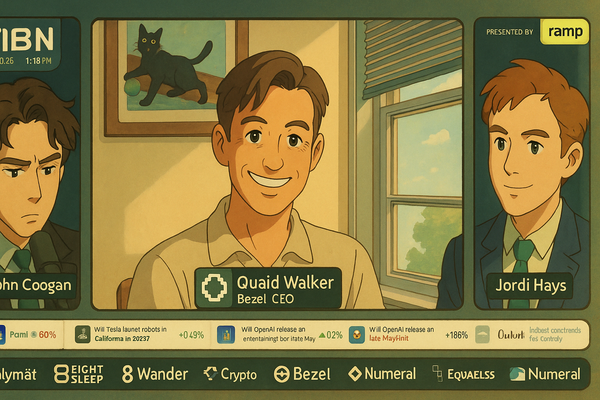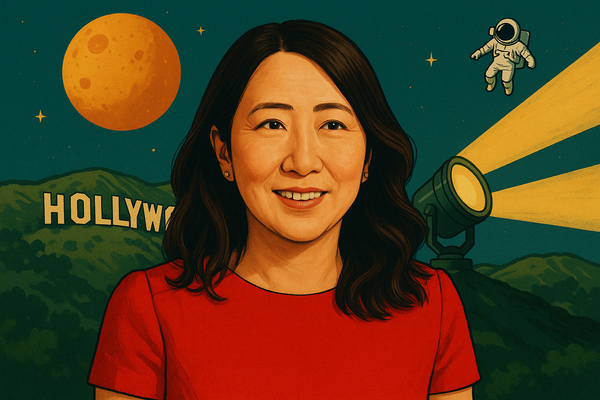Media's identity crisis
When everything is media, what's a media business?
I’m trying something a bit different by taking a step back and trying to pull together different strands to understand where the media business goes next. I also had a ton of travel and neglected to get a podcast out. Coming on Thursday (or next Tuesday, TBD).
First up, a message from The Rebooting supporter Impact.com, home of Pressboard. Branded content has become a regular part of the services modern publishers provide to their clients. Measurement is critical to success. Publishers use Pressboard to easily measure the success of your sponsored content. Check out the most recent Presssboard Benchmark Report, which analyzes 6,000 pieces of brand content across 343 different publishers, to see how your content measures up to the rest of the industry. Thanks, Impact.com, for the support.

Notes on media’s next chapter
One of the attractions of newsletters and podcasts for me is that the best ones throw off the artifice of knowing The Truth and instead are journeys of figuring it out. This is pretty much what being a human is about. We’ve always been trying to figure things out. I believe that’s what the attraction is to podcasters like Joe Rogan and Lex Fridman. The way we understand the world around us is not by rote learning of information delivered to us, it’s usually through trial and error, and discussion with others who see the world roughly as we do. If someone confidently tells you they’ve figured it all out, they’re either trying to sell you something or delusional.
I spent a few days last week in Munich, a city I’ve come to like quite a bit for being the quietest, neatest city of over 1 million on earth. Burda puts on a great event there called DLD, short for Digital, Life, Design. My session on the media business’s coming year of a reset was before ones on everything from nuclear fusion, getting brain waves to play ping pong, energy policy and even how to surf a 100-foot high wave.
What I most appreciate about DLD, despite my fondness for focus in business, is it’s proudly a liberal arts project that brings together people from different worlds who are trying to figure out the world around them. I spoke to people building AI models and anti-censorship platforms. Uncertainty was a big theme, and I feel like the best media products will be those that can connect dots beyond their focused frames. Going narrow and deep is critical, but you need to understand how the wider world works.
The purpose of The Rebooting is to find the pathways for sustainable business models for media. I have some ideas on that, but they’re limited by my own experience, personal proclivities and the circle I talk to.
One of the questions I keep confronting is even more basic: Where is media going? With the scale era fading in the rearview mirror, algorithmic anxiety taken to new heights with artificial intelligence, this joins many other items in the uncertainty bucket. It’s at the heart of the People vs Algorithms podcast I’ve been doing with Troy Young and Alex Schleifer. Troy’s approach to this foundational question is more nuanced than mine, based on his way of thinking and his far different experiences running big companies like Hearst Magazines. Alex, who was head of design at Airbnb, has a keen product sensibility and comes at the question from a different perspective.
The podcast itself is a version of a running text thread we have that can stretch hundreds of messages a day. More media companies will look like that text thread: conversations among like-minded but different people from different perspectives trying to figure things out. It’s fun, I learn a lot and it prompts me to think more deeply, even if I’m often doing the youngest-child thing of sending one-liners. The popularity of the All-In podcast is due in part to this running conversation that is imbued with interpersonal dynamics. And I believe we have exhausted ourselves from the know-it-all goofballs who tend to thrive in social media echo chambers.
The reason what makes a media business such a riddle is media itself is no longer an economic function wrapped inside a corporate entity. Media, like tech, is embedded in every company and most endeavors. Ben Smith at Semafor kicked off its quite-fun Davos pop-up newsletter by noting that the World Economic Forum itself was a very successful media company. If you thought ad tech conferences are a racket, check out the $250,000 fee WEF is charging. And that’s because if you squint, just about any company now can be considered a media company.
For years, there was a boring debate about whether Facebook and Google were media companies. Tech companies hated being branded as being in the media business. Nobody values media like tech, but the objections were directionally accurate: Hosting content on a platform isn’t quite the same as producing it. But over the years, tech companies have crossed that Rubicon and created plenty of their own content. I can’t say a decade ago I’d have expected Amazon to be winning Emmys.
And that’s because, as Joe Marchese told me, media has an outsized ability to attract attention, influence and habit, particularly compared with its ability to make money off those things. Media is a great front end to different types of businesses. Much of the go-direct mantra is overblown, if thought of as a replacement. Yet there is undeniably a new type of media emerging in which companies use their expertise, reach and unique data sets to publish themselves.
The lifestyle media of yesteryear are left battling influencers and losing as the pendulum has swung decisively in favor of individuals over institutions. Most of these formerly influential brands have lost their cultural influence, but the thing about a brand is once it has altitude it doesn’t crash to the earth even when the engines are cut. There’s a long glide path, but the end result is the same. Magazine brands are more likely to make their money hosting parties at Art Basel than selling ad pages. They’re more party planners than what was thought of as media makers. The function of the media company in this setup has been reduced to a business development, event planning and sales function with some light branding. They’re left being something of a cultural general contractor. It’s all a hustle of smoke and mirrors. At some point, they might not even bother with the publishing part, so long as the DJ is good and clients are happy.
One move Elon Musk made at Twitter that gives me joy is adding view counts to tweets. It shows how little engagement many media brands have. In my own space, I see these companies with a million followers who get 5,000 people viewing their tweets. A lot of media advantage that’s been stripped away, and will continue to be stripped away, was unearned. It was based on inheritance of key distribution relationships, search authority accrued over many years, and a marketplace reputation built by others. In the new world, you need to either earn your distribution by building a direct relationship with your audience and delivering value consistently, or you need to be an algorithmic serf. The middle always gets crushed. It’s no wonder many legacy media companies choose to milk their brands through licensing deals or operate as fronts for content marketing and events businesses.
Algorithm-driven platforms have already kneecapped many in the media business. The internet wrested control of distribution from publishers. They’ve suffered ever since. The attempts to build their own tech stacks have mostly faltered. The fancy content management systems of yesteryear that were used to raise a lot of money are now liabilities. BuzzFeed’s robust data operation was a key pillar of the “BuzzFeed envy” that swept the publishing business. It’s now a penny stock en route to being a cautionary tale.
Media companies that seemingly yesterday were the swashbuckling pirates are stuck now as bureaucratic navies fighting warfare with individual creators with no costs and an eagerness to feed the algorithms fresh content. So-called recommendation media is on the rise, and it’s not a battle for publishers who have high costs of production, distribution and monetization.

In Zephr’s newest eGuide discover the trends that are impacting the digital publishing industry and find out about the opportunities that are emerging for publishers over the next year.This is a perfect opportunity to stay ahead of the curve and discover ways to grow your revenue in 2023. To find out more click here and download today.

Attention is the currency of media companies. But the value of attention is going down as it becomes atomized from the fleeting interactions of algorithmic platforms. On Friday, after arriving to Newark from Munich, I tweeted an offhand ha-ha tweet about how I was now a Newark “truther.” I use Twitter in the original way – the way God intended – as a place for jokes, asides, football banter and even what I had for lunch. I don’t recognize modern Twitter with the recycled memes, threads and endless self-promotion. It is optimization to nowhere. This was, I have to say it, a good tweet because it sat in a few overlapping circles: travel hacks, subtly making fun of New Yorkers looking down on all things New Jersey, and conspiracy theories. Sure enough, thanks to Twitter’s quest to be TikTok-ish with the “For You” recommendation feature, the tweet “went viral.”
By the numbers this was the most successful piece of media I’ve ever created, with 1.3 million views, 12,500 “engagements” and all of four new followers. This is what media success looks like in the algo world. And algorithms might end up turning out to be the amuse bouche of what’s to come: fleeting interactions determined by a black box, little long-term value.
As I was sitting down to write this, my friend and Miami consigliere Alex Ragir happened to send me a text reading “I wrote your next column” with a screenshot of ChatGPT breaking down the problems of building sustainable media business models. I don’t mean to be sensitive, but I believe the robot did only a so-so job, although it hit many of the high level challenges. AI in general will further the media's identity crisis. Programmatic has altered the sales function, although anyone thinking robots will replace all humans should head to the Chandelier Bar at the Cosmopolitan during CES; trust me, the sales profession is alive and well. AI tools will inevitably augment and in some cases replace parts of the content function in media. Publishers don’t like to talk about it, but they pump out a lot of SEO pages as part of brand arbitrage strategies. Cnet is copping to its use of AI already in producing those. It can feel like death by a thousand cuts.
This will inevitably lead to plenty of hand wringing in what is certain to be the Year of AI. My experience is much of the sky-is-falling predictions will turn out to be false. And much of that is because I have yet to see much evidence that people prefer robot content to human content, at least beyond the basics. Trying to stop the use of AI, like many schools are trying, is much like trying to stop people using fire because it can be dangerous, as a publishing exec told me this morning. There is an inevitability about some tech advances. The more likely result, at least in the near term, is people learning to use these tools to be more productive. Yes, I understand the robots will get better; they’re good at optimization and imitation. That’s why I’m betting on more human content, even if it’s imperfect and sometimes wrong. Nick Cave was recently sent a song ChatGPT created off a prompt to write a Nick Cave song. Needless to say, Nick was not impressed.
“Songs arise out of suffering, by which I mean they are predicated upon the complex, internal human struggle of creation and, well, as far as I know, algorithms don’t feel. Data doesn’t suffer. ChatGPT has no inner being, it has been nowhere, it has endured nothing, it has not had the audacity to reach beyond its limitations, and hence it doesn’t have the capacity for a shared transcendent experience, as it has no limitations from which to transcend. ChatGPT’s melancholy role is that it is destined to imitate and can never have an authentic human experience, no matter how devalued and inconsequential the human experience may in time become.”
I feel like Nick is referring to all those programmatic summits I hosted over the years.
When I shared this in the text group, Troy told me most people aren’t Nick Cave. And I think that’s the point. The role of a media company is changing because most of what is produced is unremarkable, lifeless filler that can be replicated by a machine fairly easily. The first media job I didn’t get was at Dow Jones Newswire to maniacally rush to reproduce an earnings report into readable copy in under five minutes. I didn’t do well on the test; I probably mixed up a couple of numbers. Not great for that job. In truth, that job is already done entirely or mostly by machines now.
My bet is humans will always gravitate to other humans seeking to make sense of the world. This is one reason why in-person events aren’t going all virtual. I’ve called this primary-engagement media and humanistic media. It’s born from my own experience. One of the things I’ve noticed over the last two years of doing this project is that whenever I’m stuck, the more I’m myself, the more unstuck I become. I’ve never been drawn to public speaking. There are two types of people in the world: Those who love the idea of a surprise party thrown for them and those horrified by the idea. I’m the latter. I remember something Tony Hsieh once told me about how he approached speaking. He told me he didn’t really prepare in the traditional sense but instead spoke about what he knew and believed. I like that approach, particularly because I’m terrible at making slides.
One of the mistakes I find too often made in people starting newsletters or other media ventures is the tendency to pattern match. That’s why there are so many Morning Brew knockoffs and Ben Thompson knockoffs. (I regrettably did a few poor imitations of his hand-drawn charts in the earliest days of The Rebooting.) I can’t see that strategy working since it’s pretty much a ChatGPT prompt.
Differentiation has always been the hallmark of media success. You should be able to remove the branding and identify the brand. Give me an Economist article as a Google Doc, I’ll get it right 9/10 times. Same for The New Yorker because the lede is nine paragraphs long. And if it appears to be written by aliens writing back to their home planet, it’s Business Insider.
One of my favorite pieces of media in the past week was a newsletter Evan Armstrong wrote at Napkin Math, part of the Every collective. He chronicled his alienation from the cult of productivity and optimization. Many of these type A people inhabiting Twitter and LinkedIn will try to shame you into being a productivity monster. Too much of media has become that way. Chasing algorithms through pattern matching and A/B testing is a losing battle against the relentless optimization to come.

Thanks for reading all this way. It was a bit of a long one. Send me your thoughts by hitting reply or leave a comment.
If you’re interested in supporting The Rebooting and reaching 13,000 people working on building sustainable media businesses, consider a sponsorship. I’m biased, but it’s a great way to reach publishing decisionmakers and add your expertise to figuring all this out.




